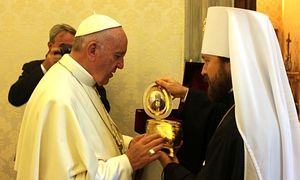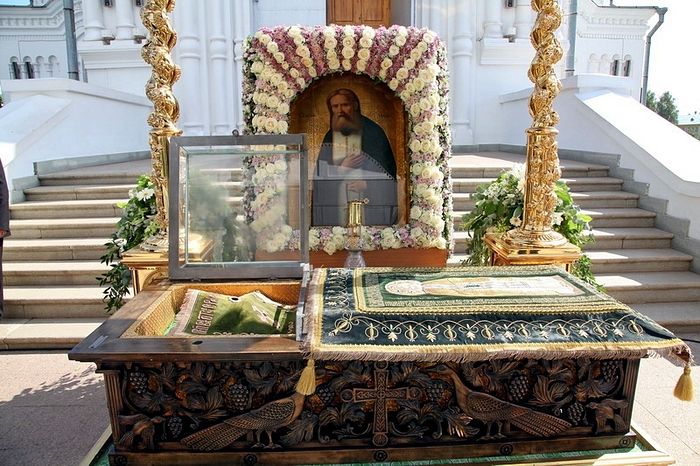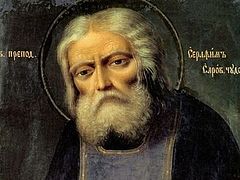On September 15, 2016, Metropolitan Hilarion of Volokolamsk, head of the Moscow Patriarchate’s Department for External Church Relations, met with Pope Francis at the Apostolic Palace in the Vatican. In Italy for a session of the Joint Commission for Theological Dialogue between the Orthodox Church and the Roman Catholic Church held in Chiet from September 15 to 22, Met. Hilarion, on behalf of His Holiness Patriarch Kirill, gifted the Pope of Rome a piece of the relics of the much beloved great wonderworker St. Seraphim of Sarov, in a shrine the shape of a Paschal egg.
Unsurprisingly, this has caused consternation among the Orthodox faithful, especially of the Moscow Patriarchate. The issue is not one of begrudging any and all pleasantries towards the Catholic prelate, but is focused rather upon the importance given to and the seriousness with which Orthodox Christians relate to the holy relics of the saints.
As St. Justin Popovich, the incomparable saint of the twentieth century Serbian Church, explains, relics, in fact, lie at the very heart of the New Testament faith of the Orthodox Church.[1] It can even be said that relics confirm for us the mystery of faith. In proclaiming the Incarnation of the Son and Word of God the Orthodox Church proclaims the sanctification of the material world, and chiefly of the human body, summoned unto the status of the Holy Spirit’s own temple (1 Cor. 6:19). The relics of the saints, with their sweet fragrances, miraculous healings, and myrrh-streaming properties—all signs of the grace of the Spirit that continues to abide in them—thus serve for the faithful as the confirmation of their Orthodox faith.
St. John Damascene, the great saint, hymnographer, and dogmatician of the seventh—eighth centuries explains: “The saints have become according to grace that which the Lord Christ is according to nature. That is, they have become gods according to grace: pure and living habitations of God. For God says: ‘I will dwell in them, walk in them, and I will be their God’ (2 Corinthians 6:16; Leviticus 16:12).” Thus we see that relics are explained by the distinction between God’s nature and grace, His essence and energies—a distinction known only to Orthodox theology and Orthodox praxis.
 Met. HIlarion (Alfeyev) gifting the relics of St. Seraphim of Sarov to the Pope of Rome. Photo: https://mospat.ru/en/2016/09/15/news135747/
Met. HIlarion (Alfeyev) gifting the relics of St. Seraphim of Sarov to the Pope of Rome. Photo: https://mospat.ru/en/2016/09/15/news135747/ An Orthodox altar is incomplete without relics—an altar into which the Pope of Rome is not permitted to enter. The Body and Blood of Christ is consecrated in the presence of holy relics—the precious Communion of which the Pope of Rome is not permitted to partake.
In light of this serious understanding of relics, Fr. Peter Heers, holding a doctorate in Dogmatic Theology from the Theological School of the University of Thessalonica with a keen interest and expertise in ecclesiology, raises some serious questions, which deserve a serious answer. Noting the disturbance and disappointment brought to the faithful, he asks:
“Can a Patriarch or Metropolitan take relics and give them to heretics? Is this permitted by the canons of the Church? Does this express Orthodox ecclesiology? Does this lead people to the Church or mislead them?” “Are the relics ‘ours’ to give? Do they belong to us or … we to them?” “Why is this not a case of throwing pearls before swine (with ‘swine’ here meaning those who cannot understand [not having the spiritual presuppositions to properly value] and do not glorify in an Orthodox manner)?”
In the same vein, Fr. George Maximov, a beloved Moscow priest active in Orthodox catechism and missionary work both at home and abroad, offers his own thought-provoking reflection and series of questions:
The “gift” to the Pope of Rome:
As I learned, not long ago Metropolitan Hilarion of Volokolamsk met with the Pope of Rome and gifted him a piece of the relics of St. Seraphim of Sarov in a reliquary. Having read this news, the first thought to arise within me was: “And how would St. Seraphim himself react to such a step?” I know that there are quite different people among those calling themselves Orthodox, but even among those who maintain absolutely different views than I, I think you could hardly anyone who could seriously declare: “Yes, I believe that St. Seraphim desired that after his death his relics would be given to the Pope of Rome.”
Ok, maybe someone will say that it’s an abstract question, and the head of a Synodal department isn’t obliged to be guided in his actions by such “mystical” reasoning. But here’s another question, more practical: “How will the faithful of the Russian Orthodox Church feel about this?” Could it really be that the head of a Synodal department doesn’t need to ask this when planning his public actions? Is it really so difficult to foresee that many believers will perceive this action with pain? Does Met. Hilarion sincerely believe that after publication of the news of such a gift, the DECR’s[2] mail will be flooded with the faithful’s grateful letters saying, “Finally! We’ve waited for this for so long!?” Or he thinks that the faithful simply don’t care? Or is it that he absolutely doesn’t care what our believers think?
 Fr. George Maximov, celebrating a mass Baptism in the Philippines. Photo: http://journeytoorthodoxy.com/2016/02/99-baptized-in-mass-baptism-into-orthodoxy/
Fr. George Maximov, celebrating a mass Baptism in the Philippines. Photo: http://journeytoorthodoxy.com/2016/02/99-baptized-in-mass-baptism-into-orthodoxy/ And the most important question: “WHY?” In the West, of course, there was a time of wheeling and dealing in holy relics, but this time passed already long ago. Now Catholics don’t know what to do with the relics of their own saints. Some are placed in a frame behind glass and hung on the wall, like a part of the interior design. Others gather dust in various repositories or are displayed in museums, where it’s no longer the relics themselves that are valued, but the expertly made reliquaries. Others try to sell them off—ebay is overflowing with such offers. In the church of Sts. Peter and Paul in Rome there isn’t even a line of pilgrims to the shrines over the relics of Sts. John Chrysostom, Leo the Great, and Gregory the Dialogist—all around it’s empty. For Catholics, the veneration of the relics of their own saints is largely irrelevant—so why give the Pope of Rome the relics of a saint they don’t even honor?
In this situation there are no complaints against the Pope of Rome—he was given something completely unnecessary for him and he behaved as does any polite person when given something completely unnecessary: he smiled and said “thank you.” Now, probably, this Orthodox sacred object has been sent to the warehouse of useless items gifted to the Pope of Rome, where it will gather dust until the end of the ages.
Fr. George ends his reflection: “But maybe I’m incorrect in my critical attitude—thus I have placed below a poll in which you are invited to take part and express your attitude to this given action.” At the time of writing of this article, 1,642 people had cast a vote in the same poll hosted on his Russian social media page—153 expressing an indifferent attitude towards the gifting of the relics of St. Seraphim to the Pope of Rome, 246 positive, and 1,243 negative.





No comment or response? I'm asking because I don't speak Russian fluently. Has Met. Hilarion or the Patriarchate addressed these criticisms, at all?
So, why did he do this, knowing full well in advance that it was an extremely controversial action, and knowing full well that people would overwhelmingly disapprove of this? The Russian Church is free from political control - correct? Or not correct? This smells to me of Masonic influence somewhere. Did Met. Hilarion just decide one day to do this on his own (of course not), or did someone else direct him to give these relics to Francis? If so, who is directing the ecumenist agenda to the MP? Is it just the bishops themselves, or someone else?
Very little to none of this information ever gets into the English-speaking world. This is very confusing for me. Fr George asks here, "WHY?" - did he ever get an answer to this question?
Thank you for your time.
Has Metropolitan Hilarion ever addressed these concerns, or answered any of these questions surrounding this incident, or has the Patriarchate released any statement about it?
I have heard reports that he is a secret Catholic cardinal, or more likely a Freemason. Is it possible for you to comment on this?
http://classicalchristianity.com/2013/07/18/on-st-seraphim-of-sarov-and-francis-of-assisi/
That being said, Met. Hilarion and Patriarch Kirill would benefit greatly by relearning the faith from the hierarchy of the ROCOR. I can't phrase it any more politely than that. Patriarch Kirill caused a scandal in his joint statement with the pope and Met. Hilarion has done this little travesty.
At some point the MP is going to have to take responsibility for relearning the faith that was only kept intact in the Church Abroad.
The problem is to make the dogs understand it!